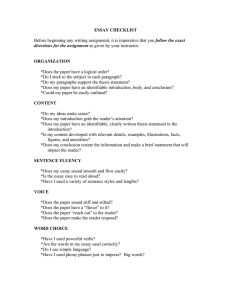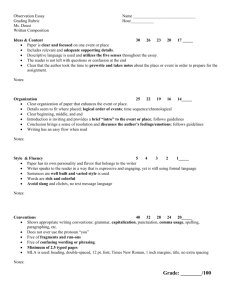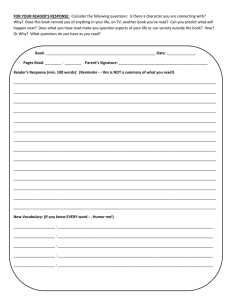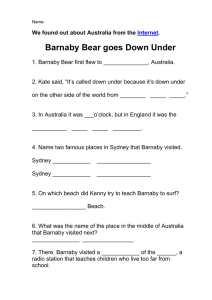Factors to keep in mind when developing a personal statement
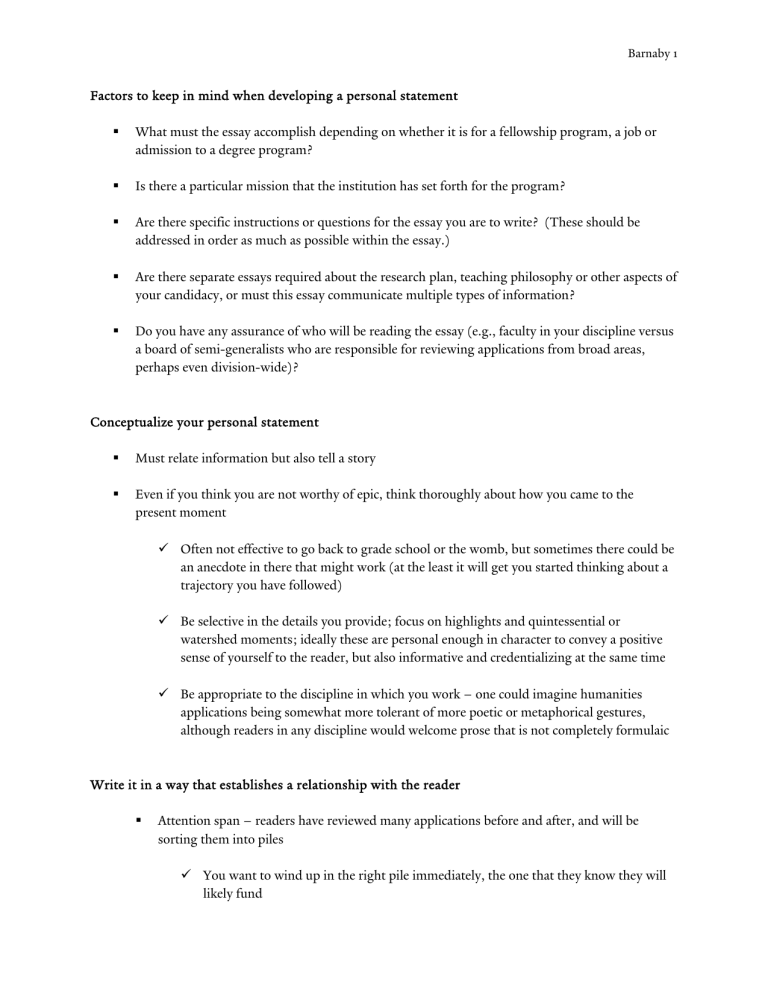
Barnaby 1
Factors to keep in mind when developing a personal statement
What must the essay accomplish depending on whether it is for a fellowship program, a job or admission to a degree program?
Is there a particular mission that the institution has set forth for the program?
Are there specific instructions or questions for the essay you are to write? (These should be addressed in order as much as possible within the essay.)
Are there separate essays required about the research plan, teaching philosophy or other aspects of your candidacy, or must this essay communicate multiple types of information?
Do you have any assurance of who will be reading the essay (e.g., faculty in your discipline versus a board of semi-generalists who are responsible for reviewing applications from broad areas, perhaps even division-wide)?
Conceptualize your personal statement
Must relate information but also tell a story
Even if you think you are not worthy of epic, think thoroughly about how you came to the present moment
9 Often not effective to go back to grade school or the womb, but sometimes there could be an anecdote in there that might work (at the least it will get you started thinking about a trajectory you have followed)
9 Be selective in the details you provide; focus on highlights and quintessential or watershed moments; ideally these are personal enough in character to convey a positive sense of yourself to the reader, but also informative and credentializing at the same time
9
Be appropriate to the discipline in which you work – one could imagine humanities applications being somewhat more tolerant of more poetic or metaphorical gestures, although readers in any discipline would welcome prose that is not completely formulaic
Write it in a way that establishes a relationship with the reader
Attention span – readers have reviewed many applications before and after, and will be sorting them into piles
9 You want to wind up in the right pile immediately, the one that they know they will likely fund
Barnaby 2
9 You want to be memorable in case you are reviewed in the middle of the pack, particularly as the application that they truly enjoyed reading and felt that they actually learned about you as an individual
There is no set formula for this, but try to keep in mind the psychology of salesmanship
9 You want to get the reader invested in the journey you’ve had so far so that he or she will have a stake in seeing where you will go from here
You want to leave the reader with a feeling of full confidence that:
9 Your motivations for this research run deep in your academic preparation
9 If there are specific ideological or pedagogical missions for the funding, you are legitimately committed to them and did not simply decide that they are important to you after you read the eligibility requirements (these examples can be subtle and not necessarily involve activism or other conspicuous activity)
9 Your understanding of the scholarly or technical methods for carrying out your project are mature (examples of your work on past or present research projects that highlight your skills as a researcher are important)
9 You have established the relationships with faculty, peers, other institutions and resources to begin effective work immediately and make the most out of the funding you will be given
All of this must be accomplished with clarity and self-assuredness, but in a manner that is gracious and not intensely self-promoting. You want to avoid anything in your writing that will shut off the reader’s attention:
9 Predictable, common or – on the other hand – gratuitously melodramatic narratives of struggle and success (a reading by faculty and peers would help here)
9 Excessive jargon or detail about your work
9 Describing your work as a succession of chapters in a dissertation, unless specifically asked to outline it
9 Deferring excessively to other scholars, particularly in the form of lengthy quotation, instead of saying what you are doing and how this will build on or transform the paradigms they have established
9 Remaining too abstract and making assertions about your experiences – either culturally, personally, academically – without taking the time to elaborate and
Barnaby 3 develop anecdotes within your narrative to give the reader a break from absorbing dense information
9 Where multiple essays are required, providing, as much as possible, different information and anecdotes in each one so that you are not simply describing your dissertation in all of them (if you do not have enough to say, then at least look at different aspects of the same project in each essay so they do not appear entirely redundant)
Find more in the process than simply obtaining a job or money, as those outcomes are not in your control
Writing a personal statement is an opportunity to:
9 Learn about the journey you have been on and reconnect with your true scholarly passions in ways that will reinvigorate you during the long process of obtaining an advanced degree
9 Hold discussions with faculty that expand the mentoring relationship beyond writing the dissertation
9 Rehearse ways to share your research interests with various constituencies whom you will encounter in various professional situations (e.g., conferences, campus visits, etc.)
Determine how much time is appropriate to dedicate to these applications in light of other obligations
Involve peers, faculty and (when appropriate) administrators in reviewing your personal statement to ensure that it conveys what you want it to convey

